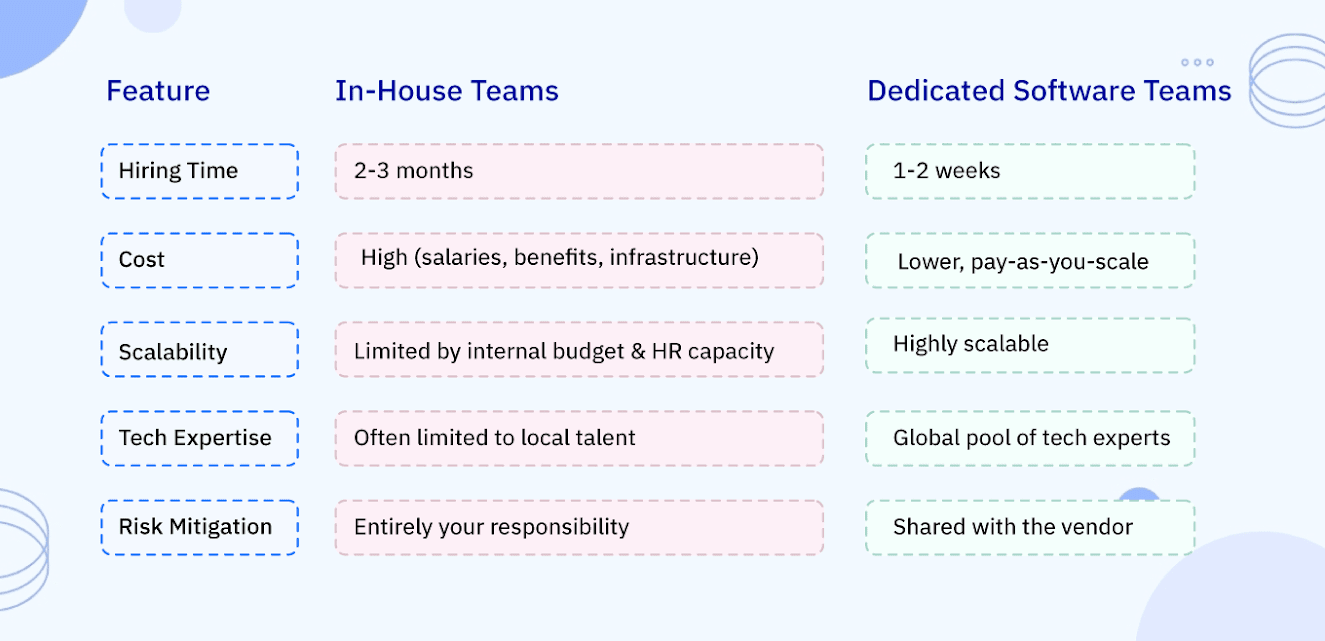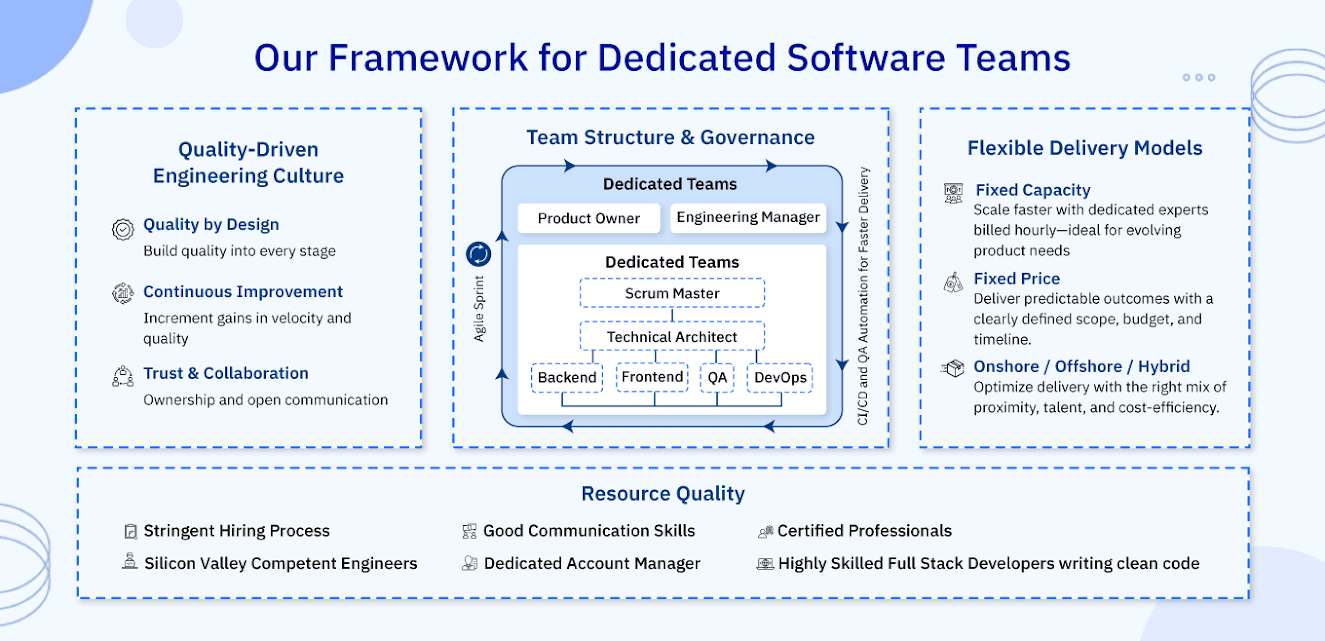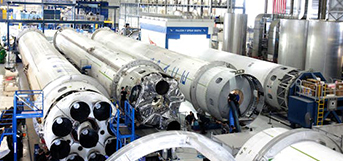75% of digital transformation initiatives fail due to execution gaps, not lack of innovation. That’s a reality that People10 Technologies has witnessed time and again, leading software projects across industries. The execution engine behind successful products? Dedicated software teams that offer the speed of agile delivery, the alignment of an in-house team, and the flexibility of outsourced execution. When built and managed right, they help you scale delivery with confidence.
Product owners scaling MVPs and CIOs leading digital transformation need more than talent—they need delivery precision. A dedicated team model offers the control of in-house teams with the speed to meet market demands.
What Are Dedicated Software Teams?
A dedicated software team is a cross-functional extension of your product engineering organization. It includes developers, QA engineers, DevOps specialists, architects, and project managers who work exclusively on your initiative. Dedicated teams don’t just support your work—they become part of it, aligning with your roadmap, sprint planning, and delivery goals from day one.
From a delivery leadership lens, they bring:
- Shared goals and stable velocity
- Platform and domain familiarity
- A sustained focus on outcomes
Why Dedicated Software Teams Outperform Traditional Models
When it comes to product delivery, velocity, control, and continuity matter just as much as talent. That’s why more engineering leaders are turning to dedicated software teams—not as an outsourcing workaround, but as a high-performance extension of their core teams.
Here’s why this model consistently outperforms traditional approaches:
Rapid Assembly, Immediate Impact
While in-house hiring cycles can stretch for 2–3 months, dedicated teams can be onboarded in 1–2 weeks, often with no impact on sprint planning. This speed matters when trying to seize a market window or unblock a release.
At People10, we offer:
- 2-week no-obligation trial
- Sprint-ready engineers screened through a 7-stage screening process
- Immediate or phased team starts
No Overhead, Full Ownership
Bringing on internal hires or using conventional outsourcing often comes with hidden overhead—like slow onboarding, HR red tape, setup costs, and compliance complexity. Dedicated teams remove those hurdles, so you can focus on building, not managing logistics.
At the same time, you don’t sacrifice control. The dedicated software teams are structured to work hand-in-hand with your internal crew, offering seamless collaboration and shared ownership of outcomes. From day one, they:
- Work within your tools (e.g., Jira, GitHub, Slack)
- Align with your sprint cadences and ceremonies
- Follow your codebase conventions, branching strategies, and release protocols
Delivery ownership remains with you—only the execution is scaled by a structurally lean but contextually integrated team.
Built-in Delivery Governance
When outsourcing lacks structure, visibility often suffers. You are left guessing about progress, quality, or delivery timelines, which makes it hard to maintain trust and accountability. Dedicated teams built for long-term delivery come with governance embedded by design, not as an afterthought.
At People10 Technologies, for example, every dedicated team is assigned a Delivery Manager who bridges the gap between engineering execution and your product roadmap. They oversee:
- Sprint hygiene and planning effectiveness
- Progress tracking via dashboards and burndowns
- NPS-style internal satisfaction scoring
- Risk identification and mitigation planning
You get not just task completion, but structured delivery governance that improves sprint over sprint, without needing to set it up yourself.
Engineering Depth and Tooling Maturity
Talent without tooling maturity often leads to stalled pipelines, unstable builds, and avoidable rework. When staffed correctly, dedicated teams come pre-equipped with not just domain expertise but also production-grade tooling knowledge.
A mature, dedicated team knows how to:
- Get your CI/CD pipeline up and running from day one with proven tools like GitHub Actions, Jenkins, or ArgoCD, ensuring faster, more reliable deployments right from the start
- Implement real-time observability using tools like Prometheus, Grafana, or Datadog to track system health and performance effortlessly
- Manage your infrastructure through code using tools like Terraform, Ansible, or AWS CDK—making deployments faster, repeatable, and easier to track
- Build secure code from the start using SAST, DAST, and IaC scanning tools
This technical readiness level means you aren’t paying for onboarding and ramp-up time—you are paying for outcomes.
Business-Driven Results, Not Just Code
A traditional vendor will show you burndowns. A dedicated delivery team will show you the business impact:
- Reduce time to market for new features to go from idea to production, helping teams deliver value to users more often
- Drop in escaped defects post-deployment
- Improvement in customer satisfaction (via product speed/stability)
- Cost savings through automation and cloud optimization
Dedicated teams are structured to understand why they are building, not just what. They collaborate closely with product owners and stakeholders, translating requirements into measurable impact. That’s the difference between completing tasks and advancing strategy.
“People10 helped us improve customer satisfaction, reduce system downtimes, and enhance overall operational efficiency.”
— Jim Wood, VP of Product & Technology, Teesnap
The Right Model for 2025 and Beyond
The pace of software change has outgrown traditional models. In 2025 and beyond, success demands:
- Faster time-to-market
- Lower risk in complex systems
- Easily adapt to evolving business needs with the built-in flexibility and responsiveness of a focused development team
Dedicated teams solve for this agility-performance equation. Unlike fixed-scope outsourcing or slow internal scaling, they:
- Scale up or down in 2–4 weeks
- Absorb product context and technical complexity over time
- Enable long-term ownership with short-term flexibility
As technologies like AI, platform engineering, and microservices evolve rapidly, dedicated teams are built to keep up—because they are engineered for change.
Dedicated Teams vs. In-House Teams: A Quick Comparison

Use Cases Where Dedicated Software Teams Shine
Dedicated software teams are not a one-size-fits-all solution—they are a strategic fit for scenarios where control, continuity, and specialized skill sets are critical. Here are the most impactful use cases of dedicated software teams:
Long-Term Product Development
Continuity is crucial when building a product that will evolve in response to market demands. Dedicated software teams shine in long-term engagements because they don’t just deliver features—they grow with your platform.
Dedicated software teams offer agility and performance by scaling quickly, absorbing complexity, and enabling long-term ownership. They are ideal for long-term product development, providing stability and continuity without the drawbacks of frequent engineer turnover. By retaining crucial knowledge throughout the product lifecycle, dedicated teams help reduce rework and technical debt.
Here’s how a dedicated team approach drives sustained product excellence over time:
- Consistent Velocity: Agile metrics like story point velocity and cycle time improve as the team gains deeper product familiarity.
- Strong Domain Knowledge: Your teams grasp how your systems work, who your users are, and what regulations need to be followed, all without constant hand-holding.
- Cross-release Continuity: Teams maintain continuity across releases, reducing regression risks and knowledge gaps.
- When teams deliver consistently and communicate early, stakeholders gain real trust in the process—and confidence that what’s promised will actually ship.
This model is especially valuable in industries like healthcare, fintech, and SaaS, where product evolution spans years, not months, and requires a strategic partner, not just a delivery vendor.
Rapid Team Scaling for Market Deadlines
Speed becomes a business advantage when product timelines are tied to critical business events, such as investor demos, seasonal launches, compliance mandates, or major customer onboarding.
Traditional hiring processes can’t keep up. Add onboarding, tool access, and domain ramp-up; you are months away from adding productive capacity.
That’s exactly why dedicated teams stand out—they are built for clarity, consistency, and long-term alignment.
Why This Model Wins on Speed:
- 2–3x faster ramp-up compared to in-house hiring or freelance contracting
- Pre-assembled teams with DevOps, QA, and engineering talent already aligned on agile practices
- Zero operational friction—your partner handles sourcing, onboarding, IT setup, and HR, allowing you to focus on delivery
At People10, we have helped product teams scale from 4 to 14 engineers in under 3 weeks—without skipping a sprint. This kind of velocity is vital when:
- You are facing an investor deadline and need to demo a working MVP
- A big client is waiting on a custom integration or feature release
- You are entering a competitive RFP and need to prove speed-to-execution
By extending your engineering team with a dedicated unit, you can avoid delays in approvals, recruitment, and onboarding while maintaining product consistency, code quality, and velocity.
Bottom line: If your roadmap is non-negotiable, a dedicated team helps you meet it without burning out your core engineering team or compromising quality.
Access to Specialized Tech Expertise
Modern software products aren’t just web apps—they are increasingly complex systems built with cloud-native architectures, microservices, real-time analytics, machine learning, and multi-platform experiences.
Recruiting and maintaining full-time specialists across all these areas can be both costly and challenging to manage internally. Dedicated software teams bring a clear advantage in this area.
Why Specialized Expertise Matters:
- Architectural decisions made in early stages (e.g., whether to use event-driven or RESTful architecture) can affect scalability for years.
- Adoption of AI/ML, for instance, requires knowledge of model lifecycle management, bias detection, and GPU acceleration—not just Python.
- Cloud migrations and Kubernetes-based deployments demand DevOps maturity, security best practices, and infrastructure-as-code fluency.
Most companies can’t afford to keep such diverse skill sets on standby internally. Dedicated teams solve this by giving you on-demand access to niche expertise, without the long-term staffing cost.
Typical Areas Where Dedicated Software Teams Excel:
- Cloud-native development (AWS, Azure, GCP, Kubernetes, Terraform)
- Advanced front-end frameworks (Next.js, React Native, Angular with state management)
- AI & ML engineering (LLMs, custom NLP models, vector DBs, MLOps)
- DevOps & SRE (CI/CD pipelines, observability, SAST/DAST integration)
- Data engineering (ETL pipelines, streaming with Kafka, Snowflake architecture)
- Mobile-first strategy (Cross-platform and PWA builds with offline-first UX)
At People10, we have supported clients who needed to:
- Spin up a Kubernetes-based microservices platform in under 45 days
- Develop a secure, HIPAA-compliant healthcare app that seamlessly integrates with FHIR-based data systems
- Add a GenAI-powered search assistant to an existing enterprise knowledge base
In each case, the ability to bring in expert engineers who were already fluent in the required stack and domain was a game-changer.
Bottom line: Dedicated teams aren’t just more hands—they are the right hands, capable of solving deep technical challenges without the ramp-up time or recruiting friction.
Legacy Modernization and Replatforming
Legacy systems are often the invisible anchors holding back enterprise agility. Whether it’s a monolithic core application, outdated infrastructure, or fragile integration layers, these systems can drain engineering capacity, inflate operational costs, and slow innovation.
Yet, many organizations continue to run mission-critical processes on these aging platforms due to the perceived complexity of modernization.
This is where dedicated teams provide a clear advantage in speed, efficiency, and compliance.
Why Modernization Demands Dedicated Focus
Legacy transformation is not a one-off activity—it’s a phased, high-stakes initiative that requires:
- Understanding how the pieces fit—your workflows, system logic, and the dependencies that can’t break—so they build with care and foresight
- Patience to refactor incrementally without disrupting operations
- Consistency in architectural choices, testing, and deployment
- A DevOps-enabled foundation to support parallel development and CI/CD
Unlike traditional outsourcing models that rotate resources or only support feature-level tasks, dedicated teams offer the continuity and architectural discipline needed for successful replatforming.
What Dedicated Software Teams Bring to Modernization Projects:
- Architectural Stewardship: From designing microservices to defining integration APIs, they ensure your system evolves with performance, modularity, and resilience.
- Parallel Delivery Tracks: Modernization rarely happens in isolation. Dedicated teams handle legacy support while building the new system in parallel, minimizing disruption.
- Automated Refactoring: With DevOps and CI/CD built in, automated testing and gradual releases ensure stability across modernization phases.
- Compliance-First Engineering: Dedicated teams build modernization pipelines for regulated industries that incorporate GDPR, HIPAA, SOC2, or ISO 27001.
Debunking Myths About Hiring Dedicated Software Teams
Myth 1: Dedicated teams are just a startup solution—but enterprises rely on them just as much for speed and scale.
Myth 2: Remote teams are tough to handle, but with the right tools and governance, collaboration is seamless.
Myth 3: Dedicated teams are more expensive over time, when in fact they often save costs through reduced delays, rework, and attrition.
Myth 4: Dedicated teams handle just basic tasks—today, they drive everything from complex cloud builds to AI implementations.
How to Hire a Dedicated Software Team in the USA (and Beyond)
Hiring a dedicated software team isn’t just a procurement decision—it’s a strategic move that impacts your velocity, product quality, and business outcomes. Dedicated teams help reduce delivery risk by locking in sprint cadence, velocity benchmarks, and accountability from day one. Whether you are a scale-up under pressure to deliver or an enterprise modernizing legacy systems, the right team structure can determine project success.

Here’s a structured approach to hiring the right team, especially if you target U.S.-based or nearshore talent with a global delivery capability.
Step 1: Define What Success Looks Like
Before talking to vendors, define what you are solving for:
- Is it faster MVP delivery?
- Do you need to scale engineering by 10x without bloating internal headcount?
- Is it domain expertise, cloud readiness, or transformation agility?
Clarify:
- Scope and timelines
- Tech stack and tooling
- Roles required (engineers, DevOps, QA, designers, etc.)
- Desired overlap in working hours and communication cadence
Bonus tip: Document known constraints early—budget limits, compliance needs, or tool preferences. It speeds up alignment with vendors.
Step 2: Shortlist a Delivery-Focused Software Development Company
You are not looking for body shops. You are looking for execution partners.
When evaluating vendors:
- Ask about similar projects delivered—industry, complexity, scale
- Assess team readiness—do they have the right skill mix available now?
- Request to meet Delivery Managers and Tech Leads, not just sales
- Look for built-in governance—dashboards, sprint hygiene, real-time visibility
- Evaluate their IP security, compliance certifications, and onboarding flow
For teams in the USA, consider companies with onshore-offshore hybrid models—offering local accountability and global scalability.
Step 3: Align Early on Process and Communication
The best results come when external teams blend seamlessly into your internal rhythms.
Ensure early alignment on:
- Agile practices (Scrum, Kanban, SAFe)
- Sprint planning, demos, and retros
- Code reviews, branching strategy, and release cadence
- Tool stack (Jira, Slack, GitHub, CI/CD, etc.)
Don’t just hand off requirements—embed the team into your ceremonies.
Step 4: Start Small, Expand Fast
Begin with a core squad:
- 1–2 full-stack engineers
- 1 QA (manual or automation, based on need)
- 1 Scrum lead or tech lead
Run a 2–4 week pilot sprint. Measure:
- Sprint velocity
- Code quality and test coverage
- Communication clarity
- Proactive problem-solving
If outcomes align, scale the team in controlled sprints.
Step 5: Optimize as You Grow
Dedicated teams aren’t static. Your needs will evolve—so should your team.
- Rotate in new skills as product complexity grows
- Realign sprint goals as your roadmap matures
- Revisit delivery governance every 6–8 weeks for continuous improvement
The best partnerships are built on continuous feedback, not fixed contracts.
Hiring a dedicated team is not about filling seats. It’s about building an execution engine. In competitive markets like the U.S., you need a team with engineering depth, agile maturity, and ownership of outcomes.
Whether your priority is reducing lead time, increasing sprint velocity, or improving deployment frequency, our dedicated teams are built for measurable outcomes.
Want to see a dedicated software team in action at scale?
People10 Technologies helped a leading U.S. airline scale from a 10-member remote team to 10 full Scrum teams across reservations, flight ops, and compliance, delivering automation, operational efficiency, and zero-downtime improvements.
11+ years of partnership
Real-time systems for crew, aircraft, and maintenance
Fully compliant with aviation security and regulatory standards
Download the full case study to see how we engineered agility at scale.
Final Thoughts: When Success Depends on Execution, Go Dedicated
If you are serious about delivering software that scales, performs, and delivers business impact, dedicated teams are your unfair advantage.
They help you:
- Reduce risk
- Control costs
- Boost speed
- Improve quality
- Build long-term capability
Choose a dedicated software team partner with the engineering maturity, flexibility, and business understanding to deliver both code and outcomes.
Our Dedicated Software Teams Are Dedicated to Results, Not Just Code
At People10 Technologies, we build custom, scalable, high-performing software teams that plug into your vision.
Author
A seasoned tech leader with 20+ years of experience, Nisha drives global business development and client relations at People10.


